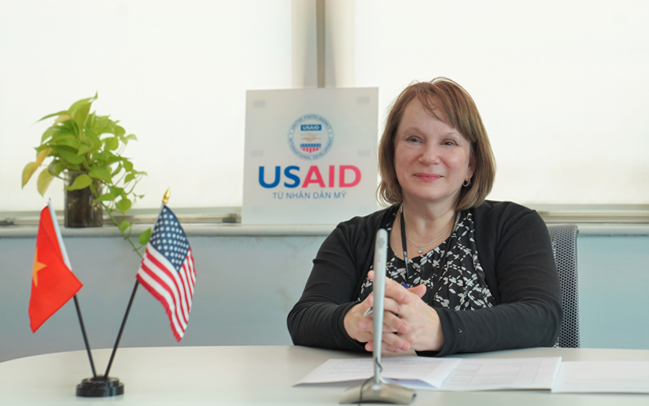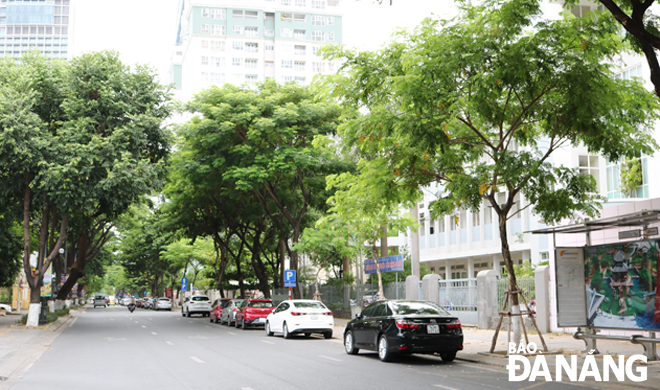USAID supports building of environmentally-friendly, green beautiful Da Nang
The U.S. Agency for International Development (USAID) and Da Nang administration has launched a roject promoting urban energy security in the city. This is part of the USAID Viet Nam Urban Energy Security, a 4-year (2019-23) project worth US$14 million. Investing in renewable energy and other advanced energy efficiency solutions will increase Da Nang competitiveness, and attract “green” investments, and directly benefit city dwellers with a cleaner environment. In addition, these solutions also contribute to the long-term mitigation of the impact of climate change to the city and its population.
 |
| USAID/Viet Nam Mission Director Ann Marie Yastishock Photo: PHONG LAN |
The USAID Viet Nam Urban Energy project is aimed at supporting the deployment of advanced and distributed energy solutions, such as rooftop solar systems, electric vehicles, waste-to-energy technology, and other energy efficiency solutions, in urban areas in Da Nang and Ho Chi Minh City.
The project is expected to addresses Viet Nam’s rapidly growing energy demand and air pollution in urban areas by working with municipal governments and creating business opportunities for entrepreneurs.
Under the project’s targets, Da Nang is expected to deploy at least 40 megawatts of advanced distributed energy and mobilize at least $60 million in public and private investment for such energy systems. At least five innovative solutions will also be demonstrated or commercialized to address urban energy and environment issues in the central hub.
“USAID is helping Viet Nam transition to a more resilient energy sector, powered by renewable energy. We are excited to work with Danang to promote clean energy in the region, provide access to technical expertise, and become a global convening center to help Viet Nam realize its goals in renewable energy,” said USAID/Viet Nam Mission Director Ann Marie Yastishock.
Previously, USAID had conducted an evaluation of 6 major Vietnamese cities by a number of criteria including the potential for developing energy market, GRDP per capita, population, management systems, power consumption and municipal governments’ willingness to partner with USAID to promote the utility of clean energy. The evaluation results show that, Da Nang is one of the eligible cities to carry out urban energy security activities as part of the project.
With regard to advantages of carrying out the project in Da Nang, USAID/Viet Nam Mission Director Ann Marie Yastishock said that Da Nang boasts great potential for developing solar power. The city currently shows the total installed capacity of rooftop solar PV panels of under 100MWp, while it can hold a real potential of more than 1,000 MWp, which means still very lots of room to develop solar energy to partially replace fossil fuels such as coal, oil and gas in the city.
 |
| Da Nang always aims to build an ecological urban area existing in harmony with the natural environment. Here is a section of Tran Phu downtown street, which has a high percentage of tree coverage. |
Another advantage is that Da Nang is viewed as among the most dynamic, green, and smart cities in Viet Nam.
The Da Nang government has a strong commitment to respond to climate change, protect the environment and implement renewable energy and energy efficiency projects.
It has also set priorities to accelerate renewable energy and energy efficiency deployment with specific target and action plans for promoting rooftop solar promotion, renewable energy, electric vehicle charging stations, and energy conservation & efficiency.
However, there are some challenges to the implementation of the project in Da Nang. A favourable environment has yet to be created to appeal for investment from the private sector and implement action plans for promoting the development of renewable energy and boost the efficient energy use solutions.
To address these challenges, USAID will work closely with the city to improve the legal provisions related to clean energy development. In addition, this agency will also cooperate with private enterprises to expand investment in applications and innovative energy solutions.
In detail, USAID will support Da Nang to deploy advanced and distributed energy solutions such as rooftop solar systems, electric vehicles, waste-to-energy technology and battery energy storage systems.
In parallel with pushing the development of renewable energy, USAID will partner with the Da Nang government and other agencies to take other effective energy use solutions in public lighting, cold storage and other industrial processes.
For the time being, USAID is providing technical support to the Da Nang Department of Industry and Trade (DOIT) in operationalizing clean energy development strategies.
Some notable activities include the establishment of the Clean Energy Development Task Force to support the DOIT as well as the local authorities at large to improve urban energy resilience and energy security, the launching of an Energy Efficiency Award for the city to recognise local enterprises that have implemented energy efficiency measures, and the undertaking of a study to review municipal and national level regulations, policies and mechanisms to implement and enforce the Energy Efficiency Action Plan 2020 – 2030.
Over the past five years, USAID has provided $34.5 million to support the energy sector in Viet Nam and plans to commit an additional $36 million over the next five years.
Reporting by PHONG LAN- Translating by A.T